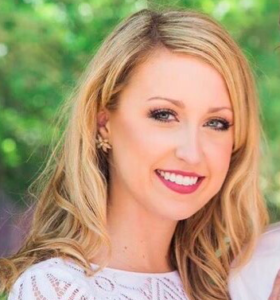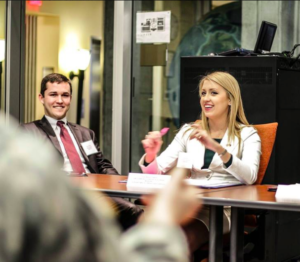
Ashley: The State Department has been my dream job since I started Model UN eight years ago, so I can relate! Model UN helped me get here in some unexpected ways. The skills I developed as a delegate help me on the job; but when it came to actually getting the job itself, my Model UN experience as an officer — along with leadership experience developed outside of Model UN — helped me more.
At one of my first MUN conferences, the Department of State’s local Diplomat-in-Residence served as the keynote speaker. His remarks sparked my passion for international affairs, and helped launch me down my path towards the State Department. When I went to UF years later, my Diplomat-in-Residence again visited the school to meet with students interested in the State Department. This time, after speaking with him, he encouraged me to apply to a State Department internship.
The internships with the Department of State are notoriously competitive; thousands of applicants apply for only a handful of spots. I was lucky enough to get one, and I believe that this is largely due to my leadership experience and professional development in undergrad, in which Model UN played a large role. Experience as a Secretariat member of the University of Florida’s high school conference, GatorMUN, and as a committee director at our college conference, FLCS, helped illustrate different dimensions of my leadership skills that were separate from my experiences as a Head Delegate. Other professional development experiences, such as being a Director in Student Government, a Recruitment Director for March of Dimes, holding various leadership positions in my sorority, and an internship with U.S. Senator Bill Nelson, helped me to develop a professional arsenal that made me equipped to tackle a competitive internship like the State Department’s.
I want to iterate, though, that while MUN can prepare you for working in real international relations institutions in many ways, it is important to recognize that not everything transfers directly. Some skills which may seem directly parallel are actually very different when applied to reality. In my experience, many delegates excel in the committee room and hold a genuine passion for international relations, and often expect this to directly translate into a professional career; but in my experience, this is not always the case. For me, while Model UN gave me the skills that helped me to create stepping stones to get to the State Department, Model UN itself was not the direct stepping stone that got me here. Make sure to diversify your interests and activities beyond Model UN when you can, and find other ways to further develop the lessons learned from MUN, while also developing diversified professional experience that can directly translate to a career in international affairs.
KFC: You’re now a Program Specialist focusing on Israel and Palestine at the State Department. What’s that job like? Did you develop certain skills in Model UN that help with your career now?

In my role, I use skills every day that I would not have honed without my time in Model UN, both as a delegate and an officer, but often not in the ways that one would initially think.
As a delegate, Model UN helped develop my research and analytical skills, which are particularly critical when working in foreign policy. The substantive knowledge gained from years on the circuit, such as different countries’ policies on various global issues, international organizational structure, and historical precedent also has been exceptionally helpful, particularly when working with a region that regularly faces complex issues that span across many cultures, religions, and state actors.
But to a much greater extent, Model UN has helped me in my career with much less tangible skill sets. Diplomacy is all about ‘soft power’, and Model UN develops those skills exceptionally well. The ability to remain calm under pressure, to respond to adversity with poise and tact, to think critically on your feet, and to remove bias when representing a policy that may or may not reflect your personal opinion, underpins the nature of working in the federal government, particularly in the Department of State. Certainly, more obvious Model UN skills like public speaking have served me well, such as when presenting to a group of senior officials or giving remarks to an audience – but I frequently find myself drawing upon a set of softer skills, such as negotiating with a diverse array of views to reach a common goal, or responding swiftly and gracefully to a crisis.
KFC: Model UN crisis committees are sometimes ridiculous but also sometimes scarily accurate. In what ways is MUN similar or different to how international relations are conducted at the State Department?

In terms of similarities, crisis committees were built around the idea of diplomacy during the Cuban Missile Crisis, in an effort to simulate the pressure-driven situations of being a decision maker in situations of high risk, visibility, and stakes. Crisis committees demand in-depth knowledge of the issues at hand, and require delegates to be prepared for anything and everything thrown their way, to reflect the need to make quick, but strongly supported logical decisions with little direct preparation. In this way, international relations conducted at high levels, such as at the State Department, require similar abilities of remaining calm under pressure, being able to work closely with peers advocating diverse perspectives and goals, and the struggle of building consensus when perceptions and interpretations of a crisis are very different.
In most Model UN committees, the actions are conducted across multilateral fora, whereas the State Department chiefly conducts bilateral relationships between the United States and individual countries, making a vastly different setup for how even to approach issues. Furthermore, in Model UN, you may find yourself working with well-researched delegates, who are vastly knowledgeable on the subject because they majored in it or wrote a thesis on it. But at State, you will find yourself working with individuals who have lived and breathed their field for years; in my office, several officials have been working on the issue for longer than I have even been alive.
Moreover, for these officials, there is much more on the line than a gavel or Best Delegation plaque. Their incentives for success are not individual recognition, but an intrinsic desire to advance U.S. interests and resolve deeply-entrenched issues. Instead of a “competition” amongst delegates for a prize at the end of a four-day weekend, there is a genuine need to channel the true spirit of diplomacy, and work with myriad actors from a wide variety of viewpoints to achieve mutually agreeable solutions. It does not come quickly; sometimes, it takes years or even decades to reach one; sometimes, a solution doesn’t come at all. Model UN by its nature will see swift progress, either from an agreeable committee or a director with an agenda and set timeline. The nature of true international relations, and of bureaucracy, though, means progress is observed on much slower, more realistic timelines.
Most significantly, however, is how drastic risk taking must be minimized outside of MUN. In Model UN, you care about your issue for four days, taking sweeping actions for the purpose of advancing debate (and on Sunday session, usually getting some laughs). In the government, those things are completely different, because actions have very real consequences at every turn. In Model UN, I believe that the nature of crisis debate can often lead delegates to develop a cognitive dissonance between the discussion and the real issues at hand. We make pun-driven directive titles, and nearly every crisis committee inevitably involves a nuclear warhead at some point. But in reality, every life, every person, and every moment demands the utmost seriousness and respect.


